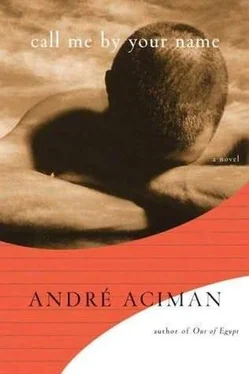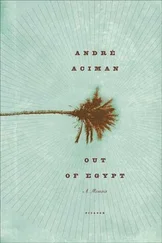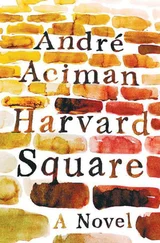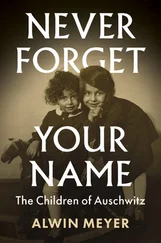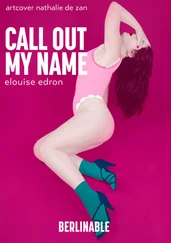André Aciman - Call Me by Your Name
Здесь есть возможность читать онлайн «André Aciman - Call Me by Your Name» весь текст электронной книги совершенно бесплатно (целиком полную версию без сокращений). В некоторых случаях можно слушать аудио, скачать через торрент в формате fb2 и присутствует краткое содержание. Год выпуска: 2007, Издательство: Farrar, Straus and Giroux, Жанр: Современная проза, на английском языке. Описание произведения, (предисловие) а так же отзывы посетителей доступны на портале библиотеки ЛибКат.
- Название:Call Me by Your Name
- Автор:
- Издательство:Farrar, Straus and Giroux
- Жанр:
- Год:2007
- ISBN:нет данных
- Рейтинг книги:5 / 5. Голосов: 6
-
Избранное:Добавить в избранное
- Отзывы:
-
Ваша оценка:
- 100
- 1
- 2
- 3
- 4
- 5
Call Me by Your Name: краткое содержание, описание и аннотация
Предлагаем к чтению аннотацию, описание, краткое содержание или предисловие (зависит от того, что написал сам автор книги «Call Me by Your Name»). Если вы не нашли необходимую информацию о книге — напишите в комментариях, мы постараемся отыскать её.
is clear-eyed, bare-knuckled, and ultimately unforgettable.
Call Me by Your Name — читать онлайн бесплатно полную книгу (весь текст) целиком
Ниже представлен текст книги, разбитый по страницам. Система сохранения места последней прочитанной страницы, позволяет с удобством читать онлайн бесплатно книгу «Call Me by Your Name», без необходимости каждый раз заново искать на чём Вы остановились. Поставьте закладку, и сможете в любой момент перейти на страницу, на которой закончили чтение.
Интервал:
Закладка:
The secret was out of my body. So what if he saw. So what if he caught me. So what, so what, so what.
On my way from his room to mine I wondered if I’d ever be mad enough to try the same thing again.
That evening I caught myself keeping careful tabs on where everyone was in the house. The shameful urge was upon me sooner than I’d ever imagined. It would have taken nothing to sneak back upstairs.
While reading in my father’s library one evening, I came upon the story of a handsome young knight who is madly in love with a princess. She too is in love with him, though she seems not to be entirely aware of it, and despite the friendship that blossoms between them, or perhaps because of that very friendship, he finds himself so humbled and speechless owing to her forbidding candor that he is totally unable to bring up the subject of his love. One day he asks her point-blank: “Is it better to speak or die?”
I’d never even have the courage to ask such a question.
But what I’d spoken into his pillow revealed to me that, at least for a moment, I’d rehearsed the truth, gotten it out into the open, that I had in fact enjoyed speaking it, and if he happened to pass by at the very moment I was muttering things I wouldn’t have dared speak to my own face in the mirror, I wouldn’t have cared, wouldn’t have minded — let him know, let him see, let him pass judgment too if he wants — just don’t tell the world — even if you’re the world for me right now, even if in your eyes stands a horrified, scornful world. That steely look of yours, Oliver, I’d rather die than face it once I’ve told you.
Part 2. Monet’s Berm
Toward the end of July things finally came to a head. It seemed clear that after Chiara there had been a succession of cotte , crushes, mini-crushes, one-night crushes, flings, who knows. To me all of it boiled down to one thing only: his cock had been everywhere in B. Every girl had touched it, that cock of his. It had been in who knows how many vaginas, how many mouths. The image amused me. It never bothered me to think of him between a girl’s legs as she lay facing him, his broad, tanned, glistening shoulders moving up and down as I’d imagined him that afternoon when I too had wrapped my legs around his pillow.
Just looking at his shoulders when he happened to be going over his manuscript in his heaven made me wonder where they’d been last night. How effortless and free the movement of his shoulder blades each time he shifted, how thoughtlessly they caught the sun. Did they taste of the sea to the woman who had lain under him last night and bitten into him? Or of his suntan lotion? Or of the smell that had risen from his sheets when I went into them?
How I wished I had shoulders like his. Maybe I wouldn’t long for them if I had them?
Muvi star .
Did I want to be like him? Did I want to be him? Or did I just want to have him? Or are “being” and “having” thoroughly inaccurate verbs in the twisted skein of desire, where having someone’s body to touch and being that someone we’re longing to touch are one and the same, just opposite banks on a river that passes from us to them, back to us and over to them again in this perpetual circuit where the chambers of the heart, like the trapdoors of desire, and the wormholes of time, and the false-bottomed drawer we call identity share a beguiling logic according to which the shortest distance between real life and the life unlived, between who we are and what we want, is a twisted staircase designed with the impish cruelty of M. C. Escher. When had they separated us, you and me, Oliver? And why did I know it, and why didn’t you? Is it your body that I want when I think of lying next to it every night or do I want to slip into it and own it as if it were my own, as I did when I put on your bathing suit and took it off again, all the while craving, as I craved nothing more in my life that afternoon, to feel you slip inside me as if my entire body were your bathing suit, your home? You in me, me in you…
Then came the day. We were in the garden, I told him of the novella I had just finished reading.
“About the knight who doesn’t know whether to speak or die. You told me already.”
Obviously I had mentioned it and forgotten.
“Yes.”
“Well, does he or doesn’t he?”
“Better to speak, she said. But she’s on her guard. She senses a trap somewhere.”
“So does he speak?”
“No, he fudges.”
“Figures.”
It was just after breakfast. Neither of us felt like working that day.
“Listen, I need to pick up something in town.”
Something was always the latest pages from the translator.
“I’ll go, if you want me to.”
He sat silently a moment.
“No, let’s go together.”
“Now?” What I might have meant was, Really?
“Why, have you got anything better to do?”
“No.”
“So let’s go.” He put some pages in his frayed green backpack and slung it over his shoulders.
Since our last bike ride to B., he had never asked me to go anywhere with him.
I put down my fountain pen, closed my scorebook, placed a half-full glass of lemonade on top of my pages, and was ready to go.
On our way to the shed, we passed the garage.
As usual, Manfredi, Mafalda’s husband, was arguing with Anchise. This time he was accusing him of dousing the tomatoes with too much water, and that it was all wrong, because they were growing too fast. “They’ll be mealy,” he complained.
“Listen. I do the tomatoes, you do the driving, and we’re all happy.”
“You don’t understand. In my day you moved the tomatoes at some point, from one place to another, from one place to the other”—he insisted—“and you planted basil nearby. But of course you people who’ve been in the army know everything.”
“That’s right.” Anchise was ignoring him.
“Of course I’m right. No wonder they didn’t keep you in the army.”
“That’s right. They didn’t keep me in the army.”
Both of them greeted us. The gardener handed Oliver his bicycle. “I straightened the wheel last night, it took some doing. I also put some air in the tires.”
Manfredi couldn’t have been more peeved.
“From now on, I fix the wheels, you grow the tomatoes,” said the piqued driver.
Anchise gave a wry smile. Oliver smiled back.
Once we had reached the cypress lane that led onto the main road to town, I asked Oliver, “Doesn’t he give you the creeps?”
“Who?”
“Anchise.”
“No, why? I fell the other day on my way back and scraped myself pretty badly. Anchise insisted on applying some sort of witch’s brew. He also fixed the bike for me.”
With one hand on the handlebar he lifted his shirt and exposed a huge scrape and bruise on his left hip.
“Still gives me the creeps,” I said, repeating my aunt’s verdict.
“Just a lost soul, really.”
I would have touched, caressed, worshipped that scrape.
On our way, I noticed that Oliver was taking his time. He wasn’t in his usual rush, no speeding, no scaling the hill with his usual athletic zeal. Nor did he seem in a rush to go back to his paperwork, or join his friends on the beach, or, as was usually the case, ditch me. Perhaps he had nothing better to do. This was my moment in heaven and, young as I was, I knew it wouldn’t last and that I should at least enjoy it for what it was rather than ruin it with my oft-cranked resolution to firm up our friendship or take it to another plane. There’ll never be a friendship, I thought, this is nothing, just a minute of grace. Zwischen Immer und Nie. Zwischen Immer und Nie. Between always and never. Celan.
Читать дальшеИнтервал:
Закладка:
Похожие книги на «Call Me by Your Name»
Представляем Вашему вниманию похожие книги на «Call Me by Your Name» списком для выбора. Мы отобрали схожую по названию и смыслу литературу в надежде предоставить читателям больше вариантов отыскать новые, интересные, ещё непрочитанные произведения.
Обсуждение, отзывы о книге «Call Me by Your Name» и просто собственные мнения читателей. Оставьте ваши комментарии, напишите, что Вы думаете о произведении, его смысле или главных героях. Укажите что конкретно понравилось, а что нет, и почему Вы так считаете.
